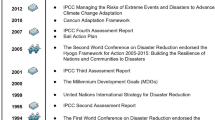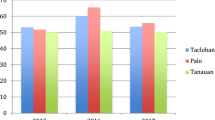Abstract
This essay defends a strong right against displacement as part of a basic individual right to secure access to one’s home. The analysis is purposefully situated within the difficult context of climate change adaptation policies. Under increasing environmental pressures, especially regarding water security, there are weighty reasons motivating the forced displacement of persons—to safeguard water resources or prevent water-related disasters. Even in these pressing circumstances, I argue, individuals have weighty rights to secure access to their homes. I explain how the home provides a functional context for conditions of autonomous agency. Being coerced from the home disrupts and subverts the conditions necessary for autonomous processes. I conclude by suggesting that the right to the home could be a foundational element of territorial rights.
Similar content being viewed by others
Notes
A property-rights approach presents an alternative to the consequentialist account. However, the property-rights approach has several short-comings, and I do not pursue it here. (1) It presupposes property rights in the home, which many people do not have. (2) It assumes, against state territorial rights, that individuals have meta-jurisdictional authorities in their homes. This leads to counter-intuitive results (Nine 2008). (3) It has some difficulty explaining why property in homes is different than property in other items. (For an example of a theory that tries to do the latter, see Radin 1986.)
Although the right is subject to constraints related to the right itself—that occupation in an area is not the result of wrong-doing, and that there is enough space ‘left over’ for others to occupy (Stilz 2013, p. 255).
An exception is when staying in the home features significantly in one’s plans (Moore 2015, p. 157).
In unusual circumstances, more than one place can serve as one’s home. For example, children whose parents live in separate houses often form a home in both places.
Prior to the widespread influence of feminist theory, most theories of the home were defined by the presence of a woman. See, for example, Levinas (1979).
It is also arguable that forced removal terminates a person’s affiliation with a particular place, and this affiliation is difficult to re-establish, especially if the person is continually forced to move. Migration diminishes the likelihood that a person will feel ‘at home’. I do not have space to pursue this line of argument here, but it is well-argued that ‘at-homeness’ is connected to security in one’s home, and that ‘at-homeness’ is a fundamental human interest (Hegel 1991; Cuba and Hummon 1993).
References
Barclay, Linda. 2000. Autonomy and the social self. In Relational autonomy: Feminist perspectives on autonomy, agency, and the social self, ed. Catriona Mackenzie, and Natalie Stoljar. New York: OUP.
Black, Richard, Stephen Bennett, Sandy M. Thomas, and John Beddington. 2011. Climate change: Migration as adaptation. Nature 478: 44–49.
Cuba, Lee, and David M. Hummon. 1993. Constructing a sense of home: Place affiliation and migration across the life cycle. Sociological Forum 8(4): 547–572.
De Lauretis, Teresa. 1990. Eccentric subjects: Feminist theory and historical consciousness. Feminist Studies 16: 115–150.
Douglas, Mary. 1991. The idea of a home: A kind of space. Social Research 58: 287–307.
Goetz, Edward. 2013. New deal ruins: Race, economic justice, and public housing policy. Cornell: Cornell University Press.
Hegel, G.W.F. 1991. Elements of the philosophy of right. Cambridge: Cambridge University Press.
Honig, Bonnie. 1994. Difference, dilemmas, and the politics of home. Social Research 61: 563–597.
Internal Displacement Monitoring Centre. 2014. Global figures. IDMC. 2013. http://www.internal-displacement.org/global-figures. Accessed 17 Sept 2014.
Jacobson, Kirsten. 2011. Embodied domestics, embodied politics: Women, home, and agoraphobia. Human Studies 34: 1–21.
Jelleyman, T., and N. Spencer. 2008. Residential mobility in childhood and health outcomes: A systematic review. Journal of Epidemiological Community Health 62: 584–592.
Kolers, Avery. 2012. Attachment to territory: Status or achievement? Canadian Journal of Philosophy 42: 101–123.
Levinas, Emmanuel. 1979. Totality and infinity, trans. Alphonso Lingis. London: Martinus Nijhoff Publishers.
Mackenzie, Catriona. 2008. Relational autonomy, normative authority and perfectionism. Journal of Social Philosophy 39(4): 512–533.
Mackenzie, Catriona, and Natalie Stoljar (eds.). 2000. Relational autonomy: Feminist perspectives on automony, agency, and the social self. New York: Oxford University Press.
Moore, Margaret. 2015. A political theory of territory. Oxford: Oxford University Press.
Nine, Cara. 2008. A Lockean theory of territory. Political Studies 56: 148–165.
O’Neill, Onora. 2000. Bounds of justice. Cambridge: Cambridge University Press.
Radin, Margaret Jane. 1986. Residential rent control. Philosophy & Public Affairs 15: 350–380.
Rawls, John. 2001. Justice as fairness: A restatement. Harvard: Harvard University Press.
Raz, Joseph. 1986. The morality of freedom. Oxford: Clarendon Press.
Sewall, May Wright. 1882. The idea of the home. The Journal of Speculative Philosophy 16: 274–285.
Shue, Henry. 1996. Basic rights. Princeton: Princeton University Press.
Simpson, Gloria, and Mary Glenn Fowler. 1994. Geographic mobility and children’s emotional/behavioral adjustment and school functioning. Pediatrics 93: 303–309.
Stilz, Anna. 2013. Occupancy rights and the wrong of removal. Philosophy & Public Affairs 41(4): 324–356.
Taylor, Robert S. 2003. Rawls’s defense of the priority of liberty: A Kantian Reconstruction. Philosophy & Public Affairs. 31(3): 246–271.
UN Commission on Human Rights. 1998. Guiding principles on internal displacement. United Nations.
Waldron, Jeremy. 1991. Homelessness and the issue of freedom. UCLA Law Review 39: 295–324.
Warfa, Nasir, et al. 2006. Post-migration geographical mobility, mental health and health service utilisation among somali refugees in the UK: A qualitative study. Health & Place 12: 503–515.
Weir, Allison. 2008. Home and identity: In memory of Iris Marion Young. Hypatia 23(3): 4–21.
Young, Iris Marion. 1997. Intersecting voices: Dilemmas of gender, political philosophy, and policy. Princeton: Princeton University Press.
Young, Iris Marion. 2005. On female body experience. Oxford: Oxford University Press.
Acknowledgments
This paper was written under the support of a grant from the Irish Research Council. Arguments in this paper have benefited from audiences at the Stanford University Political Theory Workshop and at the Philosophy Department at University College Cork, and I would especially like to thank Alex Levitov and an anonymous reviewer with Res Publica for their constructive comments.
Author information
Authors and Affiliations
Corresponding author
Rights and permissions
About this article
Cite this article
Nine, C. Water Crisis Adaptation: Defending a Strong Right Against Displacement from the Home. Res Publica 22, 37–52 (2016). https://doi.org/10.1007/s11158-015-9310-1
Published:
Issue Date:
DOI: https://doi.org/10.1007/s11158-015-9310-1




